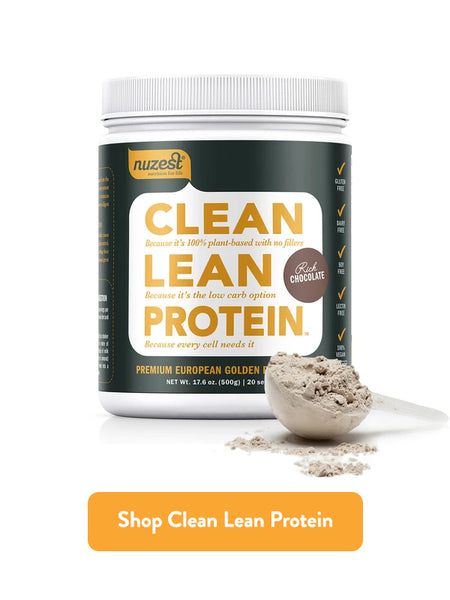Pea Protein and the FODMAP Diet—Everything You Need to Know

AUTHOR: Cliff Harvey, PhD (Clinical Nutritionist & Researcher)
Many people experience digestive issues like gas, bloating, and pain commonly grouped together as irritable bowel syndrome (IBS). The FODMAP diet (or more correctly, a FODMAP restricted diet) is clinically proven to reduce these symptoms in the short-term for those with IBS.1 Curious about pea protein and the FODMAP diet, read on to learn everything you need to know.
What are FODMAPs?
FODMAPS are types of carbohydrates and sugar-alcohols, specifically fructans, oligosaccharides, disaccharides, monosaccharides, and polyols (the term FODMAP itself, is an acronym for these Fructans, Oligo-, Di-, Monosaccharides and Polyols). These are highly fermentable in the gut and can therefore create problems for people that are sensitive to them. FODMAP sensitive individuals can experience gas, cramping, pain, and bloating from FODMAP containing foods.
For this reason, FODMAP restricted diets have demonstrated clear reductions in symptoms of IBS, however, less restrictive approaches in which participants were instructed to: regularly eat three meals and three snacks a day, never too much or too little each time, never to be hungry or too full; to eat in peace and quiet and to chew thoroughly; reduce intake of fatty or spicy foods, coffee, alcohol, onions, cabbage, and beans; avoid soft drinks and carbonated beverages, chewing gums, and sweeteners that end with -ol, and to increase fiber, have been demonstrated to be as effective as a low-FODMAP diet.2
There are also concerns over the long-term impact of a low-FODMAP diet on the microbiome as Bifidobacteria have been shown to be reduced by a low-FODMAP diet.3 So, in any event, a low-FODMAP diet is extremely useful as a treatment to reduce the symptoms of IBS, especially in the short-term.
Pea Protein and the Low-FODMAP Diet
Many protein powders and bars can contain sugars or sugar-alcohols or other FODMAP carbohydrates as sweeteners or fillers or can contain them as naturally-occurring sugars and fibers, making them incompatible with a low FODMAP containing diet.
Pea protein isolate however, contains virtually no FODMAPs due to the isolation process, which results in an extremely high protein product (up to 90% protein by dry weight) with no sugar, extremely low carbohydrates in total (less than 1 g of total carbohydrate per serving in the Smooth Vanilla) and practically no antinutrients that are commonly found in plant-based proteins.
Pea protein isolate is a zero-low FODMAP food that provides an effective protein supplement for those following a FODMAP-restricted diet. If you are looking to supplement your protein intake and are following a FODMAP-restricted diet, Clean Lean Protein is a great vegan protein option.
References
- Rao SSC, Yu S, Fedewa A. Systematic review: dietary fibre and FODMAP-restricted diet in the management of constipation and irritable bowel syndrome. Alimentary Pharmacology & Therapeutics. 2015;41(12):1256-70.
- Böhn L, Störsrud S, Liljebo T, Collin L, Lindfors P, Törnblom H, et al. Diet Low in FODMAPs Reduces Symptoms of Irritable Bowel Syndrome as Well as Traditional Dietary Advice: A Randomized Controlled Trial. Gastroenterology. 2015;149(6):1399-407.e2.
- Staudacher H, Lomer MC, Anderson JL, Barrett JS, Muir JG, Irving PM, et al. OC-054 Impact of a fermentable carbohydrate restricted diet on luminal microbiota, fermentation, symptoms and nutrient intake in patients with irritable bowel syndrome: a randomised controlled trial. Gut. 2012;61(Suppl 2):A24.










